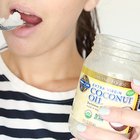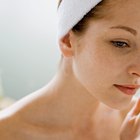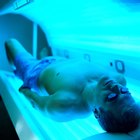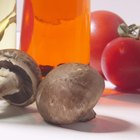Whether you call them spots, pimples or zits, the red bumps caused by acne are probably something you'd like to see less of. Acne primarily affects the upper part of the body, although it can occur anywhere. Mild cases of acne can be managed with self-treatment, but serious cases should be cared for by a dermatologist to prevent unnecessary scarring.
Acne
Acne results from a combination of three things: overproduction of sebum, a clogged pore and bacteria. Sebum is oil that is naturally produced by your skin. When too much oil is produced and becomes trapped in a pore, it provides a perfect growth medium for the bacteria that cause acne.
Antibacterial Soap
Antibacterial soaps are soaps or detergents (synthetic cleansers) that contain ingredients that kill bacteria. There are concerns that the use of antibacterial products, particularly those containing triclosan, may contribute to the rise of “superbugs,” or bacteria which are resistant to all but the most advanced chemical agents and medications. These concerns were reported by emerging infectious disease researchers working with the Centers for Disease Control as far back as 2005.
Significance
Antibacterial soaps may help kill bacteria on the skin that contribute to the development of acne. Antibacterial soaps can cause the sky to become dry and irritated, however, especially if they are not designed for facial use. Topical medications being used for acne, such as benzoyl peroxide, may have antibacterial effects, rendering the use of antibacterial soap redundant.
Considerations
Health experts, such as those at University of Wisconsin Health Services, recommend using gentle cleansers such as Purpose or Cetaphil as your first line of acne self-care. Other health experts, such as those at Southern Illinois University, say that an antibacterial soap may be helpful. Eighty-six percent of 103 reviewers at the website Acne.org reported positive experiences with and said they would recommend a particular antibacterial cleansing bar for acne treatment. Only you can determine whether an antibacterial soap helps with your acne.
Cautions
As with any product used on the skin, the potential for skin irritation or allergic reactions from antibacterial soaps exists. If any product you are using produces redness or itching, discontinue use and consult your physician. If self-care does not improve your acne after several weeks, or if your acne becomes worse, consult your physician.
Related Articles

Is Proactive Too Strong for Sensitive ...

Can Salicylic Acid & Sulfur Soap Be ...

Can Borage Oil Help Acne?

How to Calibrate the Altimeter on a ...

Pine Tar Soap for Psoriasis

Side Effects of Certain Dri

Skin Benefits of Eating Coconut Oil

What Is the Initial Breakout From ...

Toxicity of Peppermint Oil

The Difference Between Retin A & Renova

Arnica for Acne

Phototherapy Vs. Tanning Bed

Eucalyptus Oil & Acne

Uses for Castor Oil on the Skin

Can Tri-Luma Be Used to Fade Acne Scars?

Can Proactiv Solution Cause Itchy Skin?

What Are the Dangers of Anti-Aging ...

Mineral Oil Vs. Olive Oil

Olive Oil Soap for Acne

How to Get a Pimple to Go Away Fast
References
Resources
Writer Bio
Stephanie Crumley Hill is a childbirth educator who for more than 20 years has written professionally about pregnancy, family and a variety of health and medical topics. A former print magazine editor, her insurance articles for “Resource” magazine garnered numerous awards. She holds a Bachelor of Arts in English from the University of Georgia.